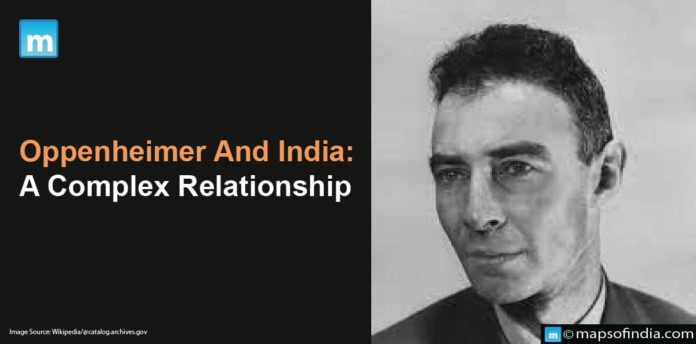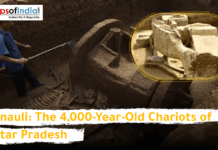The world is witnessing a great battle of Christopher Nolan’s Oppenheimer vs. Greta Gerwig’s Barbie at the box office. The craze of Barbenheimer has affected everyone, including us Indians. The films have shattered several records. Both movies are doing brilliantly at the Indian box Office. While Barbie outperforms Oppenheimer worldwide, the latter is doing much better in India. Oppenheimer is almost selling double the tickets of Barbie in the country.
The latest by Christopher Nolan is a biopic of the man known as The Father of the Atomic Bomb, J Robert Oppenheimer. The film revolves around the Manhattan Project, where Robert and his team of scientists spend years developing the world’s first atomic bomb, forever changing the course of History. Only a few know about the complex relationship between the father of the Atomic Bomb and India, which inspired, learned from, and helped him.
“Now, I am become Death, the destroyer of worlds”
Oppenheimer was deeply interested in Hindu scriptures, such as the Bhagavad Gita. The movie tells us that he was learning Sanskrit to read and understand its original texts.
The Bhagavad Gita influenced him so much that after witnessing the devastation caused during the first test of the atomic bomb, he famously quoted the original lines from the scriptures said by Lord Krishna. He recalled these lines to express his regret for creating a weapon of mass destruction.
Oppenheimer and The Father of the Indian Nuclear Program
According to the book ‘Homi J. Bhabha: A Life’ by Bakhtiyar K Dadabhoy, Oppenheimer had a friendly relationship with Homi Jehangir Bhabha, an Indian physicist the man popularly known as the father of the Indian nuclear program. The book tells us that Bhabha and Oppenheimer became good friends post World War 2. It also revealed that Bhabha had dinner multiple times with Robert and his wife, Katherine, in New York.
The book also states that Bhabha learned much from Oppenheimer and his works and considered the man his teacher. He was a significant part of Oppenheimer’s post-war life. In 1954, Oppenheimer was stripped from his security clearance and exclusion from policy decisions, which has been nicely depicted in the film. Bhabha, seeing his friend in trouble, intervened.
An Offer of Indian Citizenship
Thanks to Bhabha, Oppenheimer was offered Indian citizenship by the first prime minister of India, Jawahar Lal Nehru. Nehru invited the scientist to visit India and offered to immigrate him to the country. Oppenheimer declined this offer, saying he was “deeply patriotic” to the United States. Both men had mutual respect. The two met many times during the 1950s. In a letter to Oppenheimer, Nehru wrote that he was “deeply impressed” by his “courage and integrity,” and he expressed his admiration for Oppenheimer’s “vision of a world without war.”
Oppenheimer’s relationship with Bhabha and Nehru helped to shape his views on our country. He saw India as a country with a rich history and culture. He was impressed by India’s commitment to peace and non-violence and hoped it would be a leader in the fight against nuclear proliferation.





